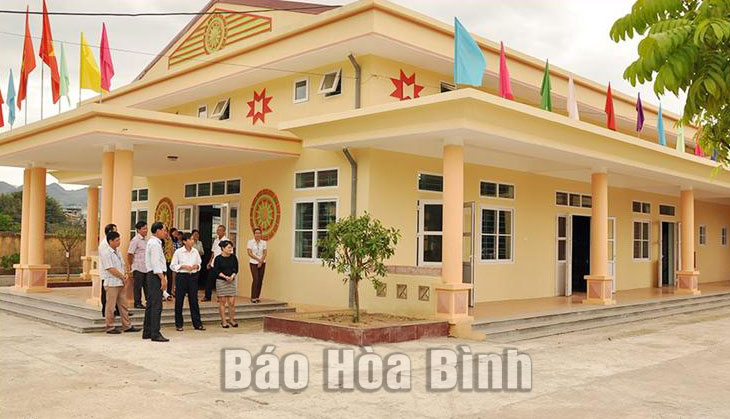
(HBO) – Hoa Binh city has regarded the national target programme on new-style rural area building as a comprehensive and long-term socio-economic development programme.Therefore, during the implementation, the locality has mobilised the involvement of the entire political system, and promoted the role of Party organisations, as well as the pioneering spirit of each official and Party member, and people’s mastery, to create consensus to complete the set targets.

The municipal People’s Committee has brought into play
different financial sources in infrastructure construction to accelerate
new-style rural area building.
The former Hoa Binh city completed the new-style
rural area building in 2018.’s Last year, under Resolution No. 830 of the
National Assembly Standing Committee, the new Hoa Binh city was formed by
merging the former city and Ky Son district.
The city now counts 19 administrative units, of
which seven are implementing the new rural area building programme.
The programme has been adjusted to make Hoa Binh
city that holds advantages and favourable natural and social conditions deserve
to be the centre of the province.
Hoang Van Minh, Deputy Secretary of the
municipal Party Committee, said the programme funding has been diversified and
integrated into other investments, including capital from the State budget,
businesses and organisations in and outside the city.
Up to five out of seven communes in Hoa Binh
city has won the new-style rural area status, with Yen Mong recognised as the
model new-style rural area, and Hop Thanh and Mong Hoa as advanced new-style
rural areas.
Notably, living standards of local residents
have been improved significantly, with per capita income reaching 66 million
VND last year and poverty rate dropping to 1.28 percent.
The city has also paid attention to
infrastructure in health care, education and transport, environment and
democracy.
To deserve the position of the provincial
economic and political centre, and implement its development plan by 2025, Hoa
Binh city will invest more in new rural area building, aiming to have all of
its communes recognised as new-style rural areas.
The Resolution adopted by the Congress of the
city Party Committee (2020-2025 tenure) stresses the leadership in building
model and advanced new-style rural areas.
Hoa Binh city is striving to win the title,
establish a new ward and become a second-tier city by 2025.
The Standing Board of the Hoa Binh provincial Party Committee has agreed in principle on a proposal by the Standing Board of the Party Committee of Hoa Binh city to gather feedback on the city’s 1:2000 zoning plan, which forms part of its broader urban development strategy.
Hoa Binh province has made notable progress in public administration reform and digital government development, with the satisfaction index among citizens and businesses reaching over 84%, according to recent government evaluations.
Thanks to great efforts by local authorities in recent times, the governance and public administration performance of Mai Chau district has been significantly improved.
In the afternoon of June 6, the Party Committee, the People's Council, the People's Committee and the Fatherland Front of Lac Son district solemnly held a meeting to celebrate the 139th anniversary of the district's founding (1886–2025) and the 79th anniversary of the establishment of the district's Party Committee (1946–2025). There was the attendance of Mr. Bui Van Thang, the Vice Chairman of the Provincial People's Council; Mr. Quach Tat Liem, the Vice Chairman of the Provincial People's Committee; Ms. Dang Bich Ngoc, the Deputy Head of the National Assembly Delegation of the province; as well as the former leaders of the province and district through various periods, who are the natives of the district.
Implementing the Politburo’s Resolution No. 57-NQ/TW on breakthroughs in science – technology, innovation, and digital transformation is a golden opportunity for the northern mountainous province of Hoa Binh to renew growth model, improve competitive edge and shorten digital gap.
Resolution 57-NQ/TW, issued by the Politburo on December 22, 2024, identifies sci-tech, innovation, and digital transformation as strategic breakthroughs to build a developed and prosperous nation. In Hoa Binh province, this spirit is not just a slogan, it’s being put into action through concrete initiatives that form a "new development triangle”: digital citizenship, digital economy, and digital administration.



